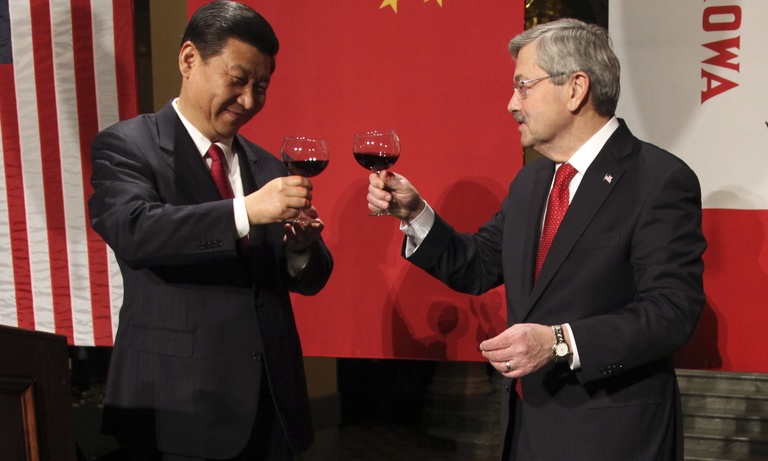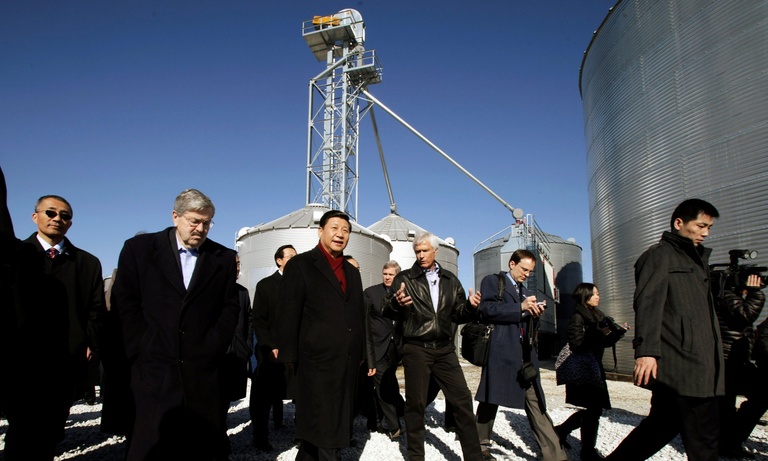Article from The Guardian by David Smith in Washington and Tom Phillips in Beijing
Nomination of President Xi Jinping’s ‘old friend’ comes after China Daily says relations are ‘facing uncertainty as never before’

Xi Jinping and Terry Branstad have known each other since 1985. Photograph: Andrea Melendez/AP
Relations between the world’s two largest economies are “facing uncertainty as never before”, China’s international mouthpiece has warned, despite Donald Trump naming “an old friend of the Chinese people” as his ambassador to Beijing.
After a torrid few days for US-China relations, Trump offered Beijing a gesture of goodwill on Wednesday by making Iowa governor Terry Branstad, who first met Chinese President Xi Jinping more than three decades ago, his top diplomat in China.
“Governor Branstad’s decades of experience in public service and long- time relationship with President Xi Jinping and other Chinese leaders make him the ideal choice to serve as America’s ambassador to China,” Trump said in a statement.
The move came less than a week after Trump upset China and broke with decades of diplomacy by taking a call from Tsai Ing-wen, the president of Taiwan – the first such top-level contact since 1979. China considers Taiwan to be a breakaway province.
Beijing was quick to hail Branstad’s appointment.
“Governor Branstad is an old friend of the Chinese people. We welcome him to play a great role in promoting the development of China-US relations,” foreign ministry spokesperson Lu Kang told reporters in Beijing.
The Global Times, a Communist party-controlled tabloid, said Branstad’s appointment suggested “there may be another dimension to Trump’s desire to maintain communications and friendliness with China” and should be given “a positive response”.
“China needs to always prepare for the worst and stay open to the good,” the stridently nationalist newspaper argued in an editorial, calling for military spending to be increased next year in response to Trump’s election.
However, in an editorial published on Thursday the English-language China Daily newspaper warned that Washington-Beijing relations, reestablished under Richard Nixon and Mao Zedong in 1972, were entering a period of unprecedented uncertainty.
China had shown “laudable prudence” in its response to “provocations” from the president-elect’s team, not least after Trump adviser Stephen Moore launched “a vulgar verbal attack against China”, telling a radio show: “I don’t care if we insult the Chinese!”
But the state-run newspaper, which serves as an international platform for Beijing’s views, said China now needed to “prepare for the worst”.
“Trump’s words are not necessarily more bark than bite,” it said, adding: ”Further provocative moves by the US president-elect and his team cannot be ruled out given the reckless and impulsive style of leadership that Trump displays”.
Questions have been raised over whether 70-year-old Branstad’s CV is relevant to such a crucial posting. Isaac Stone Fish, a senior fellow at the Asia Society’s Centre on US-China Relations, said: “On the one hand, it’s good that Trump has appointed someone who is not a radical, not ideological, not controversial on one side or the other.
“On the other hand, he’s going to be there for a while, so I hope it was thoughtful and about more than balancing the call from Taiwan. I liked a line in the Reuters report that said, ‘His many years running Iowa, the top US state for production of corn, soybeans and pigs, may not have prepared him for the more delicate tasks of diplomacy with Beijing.’”
Branstad has known Xi since 1985, when Xi visited Iowa as a young regional government official leading an agricultural research delegation. Branstad was governor at the time, and the pair remained in contact. In 2011, Branstad visited Beijing and met with Xi at the Great Hall of the People; a year later, when he was vice-president, Xi stopped in Muscatine, Iowa, where he met his host family from the 1985 trip.
Branstad, a champion of exporting Iowa’s agricultural products to China who has visited the country four times in the past seven years, said: “During our 30-year friendship, President Xi Jinping and I have developed a respect and admiration for each other, our people and our cultures. The United States-Chinese bilateral relationship is at a critical point.

Xi Jinping tours an Iowa farm with Terry Branstad in 2012. Photograph: POOL/Reuters
“Ensuring the countries with the two largest economies and two largest militaries in the world maintain a collaborative and cooperative relationship is needed more now than ever. The president-elect understands my unique relationship to China and has asked me to serve in a way I had not previously considered.”
But Branstad’s brand of “cornfield diplomacy” could be tested to the limit by his new boss. The 10-minute conversation with Tsai, which followed efforts by the lobbyist and former senator Bob Dole on behalf of Taiwan, upended relations and forced the White House to provide reassurance.
Then, on Monday, Trump wrote on Twitter: “Did China ask us if it was OK to devalue their currency (making it hard for our companies to compete), heavily tax our products going into their country (the U.S. doesn’t tax them) or to build a massive military complex in the middle of the South China Sea? I don’t think so!”
He previously hammered China during the tumultuous election campaign, accusing the world’s second-biggest economy of currency manipulation – it keeps the yuan artificially low to make its exports cheap – unfairly taxing US exports, and militarising the South China Sea. He threatened to slap 45% tariffs on Chinese products, but Chinese officials warned that Trump was bound by World Trade Organisation rules.
Branstad has overseen billions of dollars in Iowa agriculture sales to China – he was back in Beijing last month to push the state’s beef and pork exports – and established a sister-state relationship with China’s Hebei province in 1983. But he has little experience in international diplomacy.
Downing Thomas, associate provost for academic affairs and dean of international programmes at the University of Iowa, accompanied him on a trade mission to China in 2013. “I was able to see first-hand that he had strong relationships and was able to build on those,” he said. “He met President Xi for an hour.”
Thomas added: “Trump said many things during the campaign, but this appointment is a statement itself. It’s a strong opportunity to set the stage for productive relationships. The governor is a steady hand and will help in good times and help in bad times.”
The US agriculture secretary, Tom Vilsack, a former Iowa governor, told the Associated Press: “He has been a tireless advocate for trade, we all know that. He obviously has relations with Chinese officials which are important. He’s tenacious and, trust me, with the Chinese you’ve got to be tenacious.”
Branstad has previously expressed support for the Trans-Pacific Partnership, saying the trade deal would benefit Iowa’s agricultural industry. Trump opposed the agreement, which now appears dead in the water.